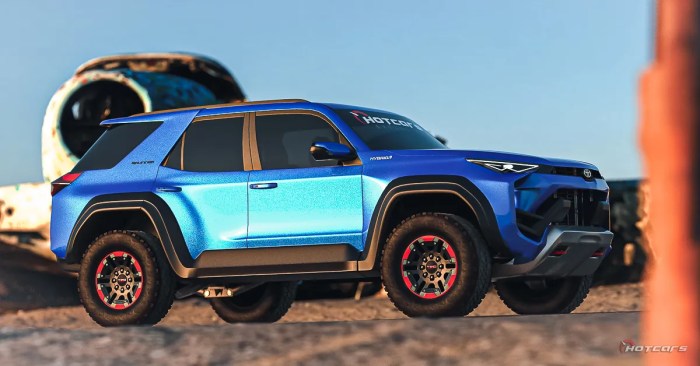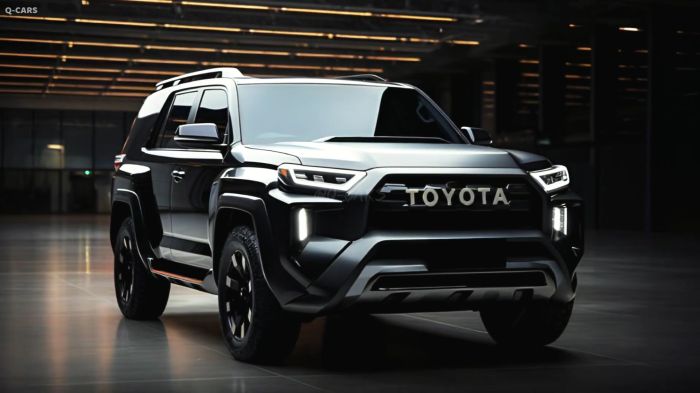The Pros and Cons of Owning a Toyota 4Runner in 2025 – The Toyota 4Runner, a stalwart in the SUV market, continues to attract buyers seeking a blend of rugged capability and everyday practicality. However, like any vehicle, it boasts its share of advantages and disadvantages. This comprehensive guide will delve into the pros and cons of owning a 4Runner in 2025, helping you make an informed decision.
The Undeniable Pros of the 2025 (and Beyond) Toyota 4Runner
Unmatched Off-Road Capability
The 4Runner’s legacy is built on its exceptional off-road prowess. Features like its body-on-frame construction, available four-wheel drive (4WD) with locking rear differential, and high ground clearance make it a formidable contender on challenging terrains. Whether you’re tackling rocky trails, traversing muddy paths, or navigating snowy conditions, the 4Runner delivers confident handling and superior traction. This is further enhanced by optional features like crawl control and multi-terrain select, providing additional assistance in difficult situations.

Source: hotcarsimages.com
For serious off-road enthusiasts, the TRD Pro trim offers even more advanced capabilities. Consider researching specific off-road features like skid plates and recovery points if serious off-roading is a priority.
Reliability and Durability
Toyota has long been synonymous with reliability, and the 4Runner upholds this reputation. Known for its robust build quality and durable components, the 4Runner is built to last. Many owners report exceeding 200,000 miles without major issues, showcasing its longevity and resilience. This inherent durability translates into lower long-term maintenance costs compared to some competitors, although regular maintenance is still crucial.
This reliability extends to both the engine and transmission, contributing to the vehicle’s overall value retention.
Resale Value
The combination of reliability and strong demand contributes to the 4Runner’s excellent resale value. This makes it a smart investment, as you’re less likely to experience significant depreciation compared to other SUVs in its class. This is particularly true for well-maintained models, especially those with lower mileage. Researching average resale values for different 4Runner trims and model years can help you understand this aspect better.
Factors such as condition and optional features significantly impact resale value.
Spacious Interior and Practicality
Despite its rugged exterior, the 4Runner offers a surprisingly spacious interior, accommodating passengers and cargo comfortably. The rear seats can be folded down to increase cargo space, making it versatile for both everyday use and outdoor adventures. The availability of various trim levels allows you to choose the interior features and configurations that best suit your needs and preferences.
Consider factors like seating capacity, cargo space, and available storage compartments when making your choice.
The Drawbacks of Owning a Toyota 4Runner
Fuel Economy
One of the most significant drawbacks of the 4Runner is its relatively poor fuel economy. Its V6 engine, while powerful, is not particularly fuel-efficient, especially when compared to modern SUVs with smaller engines or hybrid powertrains. This can lead to higher fuel costs over time, particularly if you frequently drive long distances. Consider the impact of fuel costs on your overall budget before purchasing.
Driving habits and terrain also significantly affect fuel consumption.
Outdated Technology and Infotainment
While Toyota has made some updates, the 4Runner’s infotainment system lags behind many competitors in terms of technology and user-friendliness. The infotainment system might feel outdated compared to more modern systems, lacking the latest features and intuitive interfaces. This is particularly noticeable in areas such as smartphone integration and navigation. Research the specific infotainment features offered in the year you’re considering to assess its suitability for your needs.
Ride Comfort, The Pros and Cons of Owning a Toyota 4Runner in 2025
Due to its body-on-frame construction, the 4Runner’s ride can be quite firm and bumpy, especially on rough roads. This can be less comfortable for passengers compared to unibody SUVs that offer a smoother ride. This trade-off between off-road capability and on-road comfort is a key consideration for potential buyers. Consider test driving different trims to gauge the ride comfort personally.
Limited Safety Features
While the 4Runner offers a range of safety features, some advanced driver-assistance systems (ADAS) that are standard in many newer vehicles might be optional or unavailable on certain trims. This can be a concern for buyers prioritizing the latest safety technologies. Research the specific safety features available in your preferred trim level and compare them to other SUVs in the market.
Price
The 4Runner’s price point can be higher compared to some of its competitors, especially when opting for higher trim levels with additional features. This higher initial cost should be factored into your overall budget. Consider comparing the 4Runner’s price to similar vehicles in its class before making a purchase decision.
Frequently Asked Questions (FAQ): The Pros And Cons Of Owning A Toyota 4Runner In 2025
- Q: Is the Toyota 4Runner a good car for city driving? A: While capable, its size and less-than-stellar fuel economy make it less ideal for frequent city driving.
- Q: How reliable is the Toyota 4Runner? A: The 4Runner boasts excellent reliability, often surpassing 200,000 miles with proper maintenance. [Source: Consumer Reports]
- Q: What is the best trim level for the Toyota 4Runner? A: The “best” trim depends on individual needs and budget. The TRD Pro is best for off-roading, while the SR5 offers a good balance of features and price.
- Q: How much does a Toyota 4Runner cost? A: Pricing varies greatly based on year, trim, and condition. Expect a range from $35,000 to $50,000+ for new models.
- Q: What is the fuel economy of the Toyota 4Runner? A: Fuel economy is relatively low compared to other SUVs. Expect around 16-19 MPG combined, depending on the trim and driving conditions.
Conclusion
The Toyota 4Runner remains a compelling choice for buyers who prioritize off-road capability, reliability, and resale value. However, potential owners should carefully weigh the trade-offs in fuel economy, technology, ride comfort, and price. Thorough research and a test drive are crucial before making a final decision. Consider your individual needs and priorities to determine if the 4Runner is the right SUV for you.
Call to Action
Ready to explore the Toyota 4Runner further? Visit your local Toyota dealership for a test drive and discover the perfect 4Runner for your adventures!
FAQ Resource
What is the expected resale value of a 2025 4Runner?
Resale value depends on condition, mileage, and trim level. Generally, Toyota 4Runners hold their value well.
How much does it cost to maintain a Toyota 4Runner?
Maintenance costs vary, but Toyotas are generally known for their reliability, leading to potentially lower long-term maintenance compared to some competitors.
What are the common problems with Toyota 4Runners?

Source: autoevolution.com
While generally reliable, some reported issues include potential transmission problems and certain electrical glitches; however, these are not universally experienced.
Is the Toyota 4Runner fuel-efficient?

Source: toyotadesigns.com
No, the 4Runner is not known for its fuel efficiency. Expect lower MPG compared to many other SUVs.
